LisbonLisboaPortugal.com
The best independent guide to Lisbon
LisbonLisboaPortugal.com
The best independent guide to Lisbon
Lisbon Desserts: A Guide to the City's Classic Sweet Puddings
While the legendary Pastel de Nata rightfully draws visitors to Belém, it is just the starting point of Lisbon's rich dessert culture. The city’s pastry shops (pastelarias) and restaurant menus hold a deep connection to Portugal's culinary history, especially the conventual sweets known as doçaria conventual. These recipes, built on egg yolks, sugar, and spices, form the backbone of the city's dessert offerings.
This heritage means that after a meal of grilled fish or hearty stew, you will be presented with a choice of wonderfully rich and textured desserts. The challenge for visitors comes at the end of a meal, when faced with a menu of unfamiliar local favourites like Baba de Camelo or Pudim Molotov.
This guide breaks down the classic desserts you will find across Lisbon, from the simple tascas of Alfama to the elegant restaurants of Chiado. It explains what to expect from each one, helping you choose the perfect finale to your Lisbon dining experience.
Rich Puddings & Creamy Custards
You will find these comforting, custard-based desserts on almost every menu in Lisbon. They represent the heart of the city's traditional dessert scene.
Pudim de Ovos
A fixture on menus across the city, this is the quintessential Portuguese flan. It is a dense, perfectly smooth egg pudding, made distinct by the dark, rich caramel sauce that is created in the pan during baking. For a taste of classic, unpretentious Lisbon, this is a perfect choice.
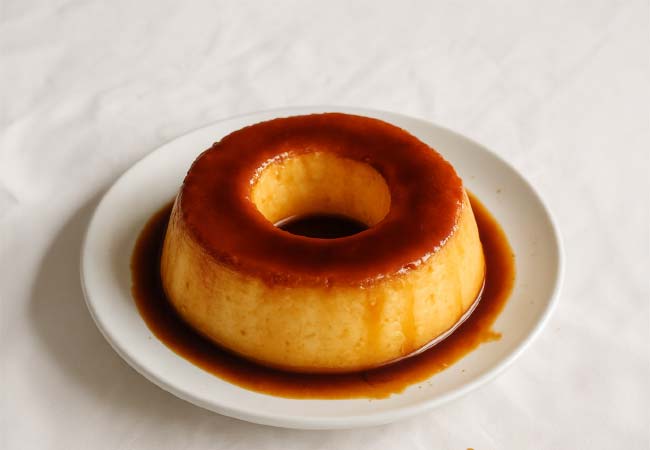
Arroz Doce
A comforting sweet rice pudding you will find in traditional Lisbon eateries, especially around holidays. The local version is famously creamy and rich, thanks to the addition of egg yolks. It is typically infused with lemon and cinnamon, with the surface often decorated with delicate patterns of ground cinnamon.
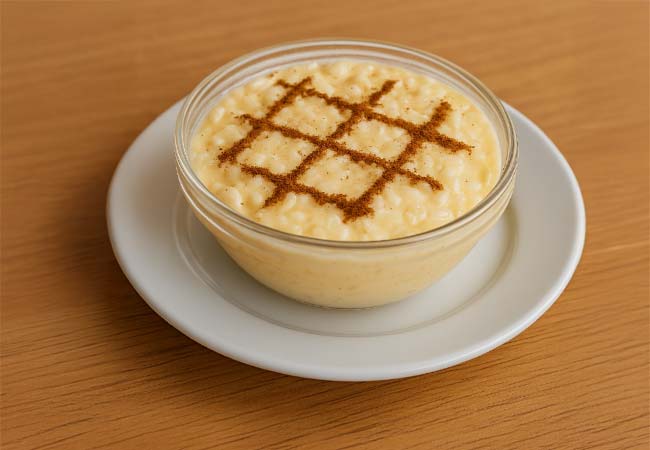
Leite Creme
Lisbon's popular answer to crème brûlée. This luscious custard is cooked on the stovetop rather than baked, giving it a slightly lighter texture. You will often see it finished at the table, with the waiter using a hot iron to caramelise the sugar topping, creating a satisfyingly crisp shell to crack into the creamy custard below.
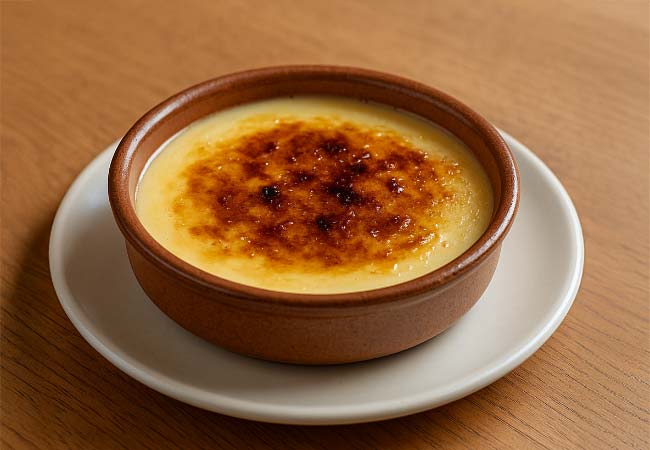
Baba de Camelo
Don’t let the name ('camel's drool') put you off. This is a ubiquitous favourite on Lisbon menus for its delicious simplicity. It is a light but rich caramel mousse made by whipping cooked condensed milk with eggs. The result is a dreamy, velvety mousse with a deep caramel flavour.
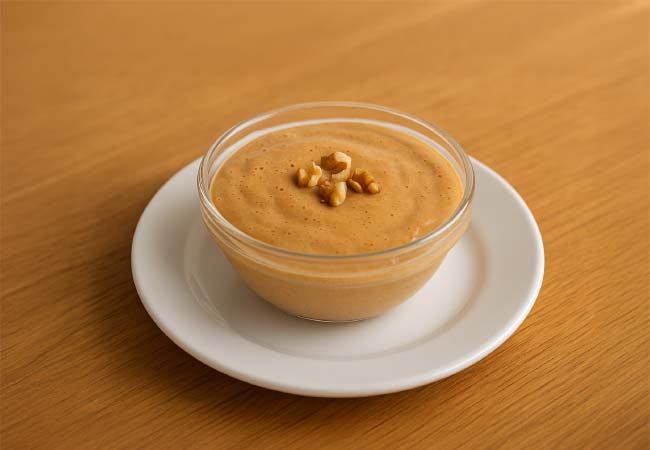
Pudim Abade de Priscos
While this recipe originates from the north of Portugal, it is considered a national delicacy and can be found in Lisbon's more traditional or high-end restaurants. It is an astonishingly rich pudding made with a large number of egg yolks, Port wine, and its famous secret ingredient, cured pork fat, which creates an unmatched silky, velvety texture.
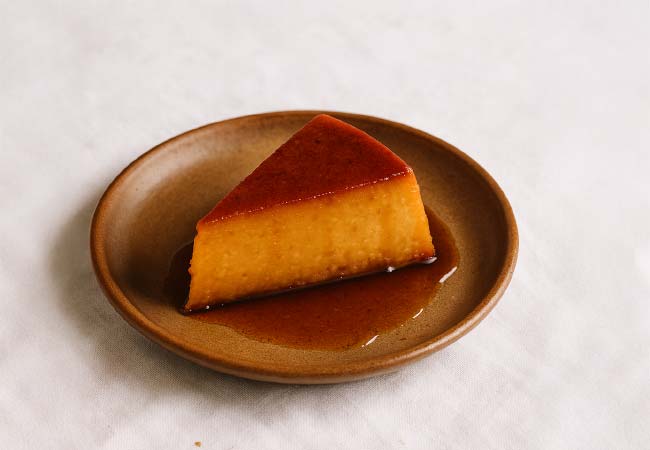
Mousse de Chocolate
A non-negotiable staple in nearly every Lisbon tasca and restaurant. The Portuguese take on chocolate mousse is characteristically intense and not overly sweet, made with high-quality dark chocolate. Its signature texture is both dense and airy, a satisfying end to any meal.
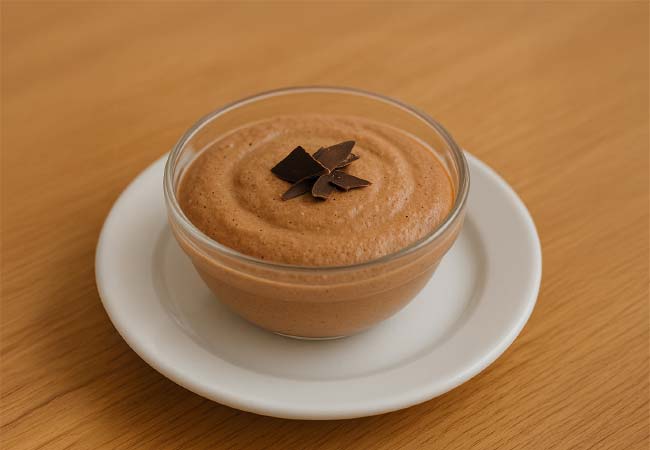
Light Meringues & Layered Cakes
For those seeking something different from a rich custard, Lisbon menus offer wonderfully light, meringue-based desserts and nostalgic, no-bake biscuit cakes.
Pudim Molotov
You will see this impressive, snow-white dessert on many Lisbon menus. It is not a typical pudding, but rather a gravity-defying cloud of baked meringue. Its incredible lightness comes from the whipped egg whites, which are gently baked in a water bath. The delicate sweetness is perfectly balanced by a rich caramel sauce.
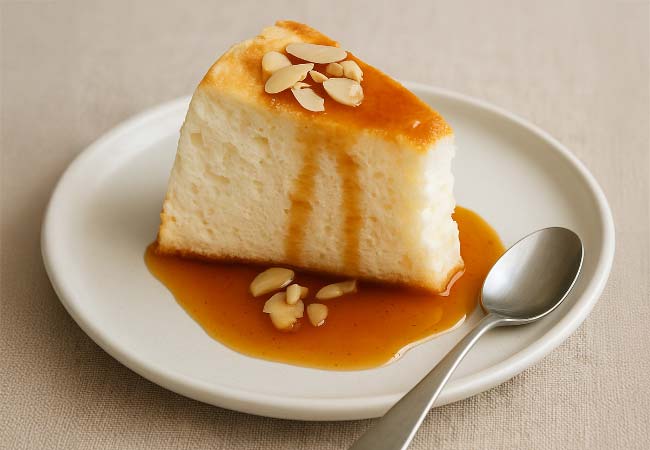
Farófias
A nostalgic dessert that often appears on the menus of family-run Lisbon restaurants. It consists of soft, fluffy meringue "clouds" poached in sweet, cinnamon-and-lemon-infused milk. The dish is finished with a creamy custard sauce made from the leftover egg yolks, offering a taste of a traditional Portuguese home.
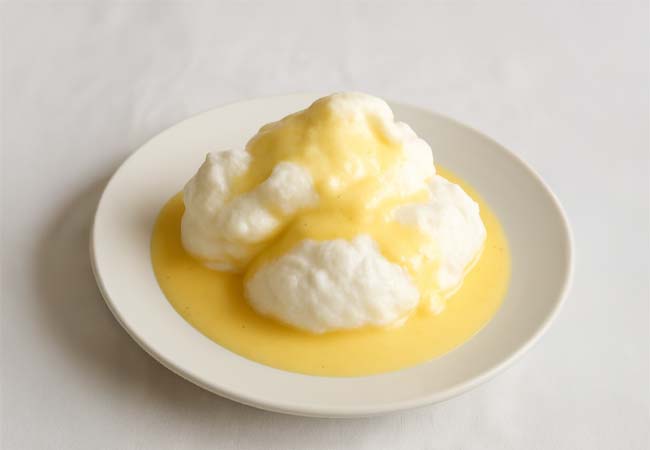
Bolo de Bolacha
This beloved no-bake cake offers a true taste of a Lisbon childhood. It is made from layers of Bolacha Maria (a common biscuit) soaked in strong coffee, alternating with a very rich buttercream made from butter, sugar, and egg yolks. After chilling, it slices like a cake, revealing its striped layers.
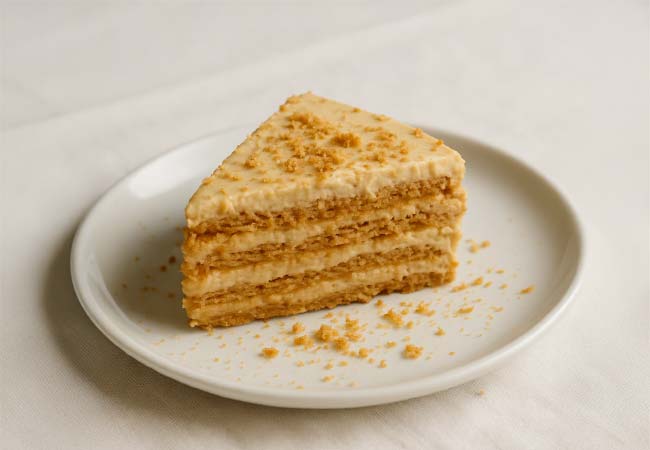
Tentação (Temptation)
A popular fixture in casual Lisbon restaurants, this no-bake dessert is a local take on Tiramisu. It features layers of coffee-dipped Bolacha Maria biscuits and a sweet, simple cream made from condensed milk and whipped cream. It is a simple, decadent, and deeply satisfying treat.
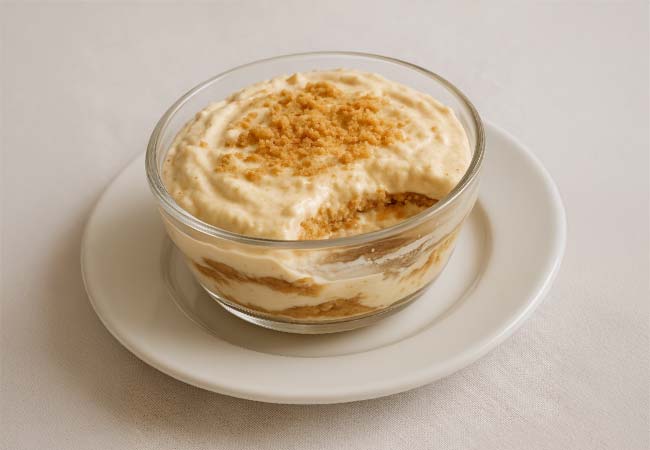
Finishing Your Meal: Ordering Coffee in Lisbon
There is an unspoken rule when dining out in Lisbon: the meal is not truly over until the coffee has been served. After dessert, the question is not if you will have coffee, but which kind. While you can always ask for 'um café' and be perfectly understood, the authentic Lisbon way is to order 'uma bica' (ooma bee-kah).
This is the Lisboetas' name for a strong, sharp shot of espresso. While the name's origin is debated, it is the city's universal term for the small, powerful coffee served in a demitasse cup. Your bica will arrive hot, aromatic, and with a thick crema, offering a pleasantly bitter counterpoint to your sweet dessert. While milky coffees like the galão are for breakfast, the bica is the only socially correct way to punctuate the end of lunch or dinner.
What to Drink With Your Dessert
To extend the dining experience like a true Lisboeta, consider a digestif with your dessert or coffee. Port wine is always a fine choice, as is a glass of Licor Beirão, Portugal's most popular herbal liqueur.
However, for a truly Lisbon experience, order a Ginjinha. This iconic sour cherry liqueur is famously sold in small stalls throughout the city, but it's also a common way to finish a meal. Its sweet and tart flavour works especially well with chocolate desserts. Served in a small glass, sometimes with a cherry at the bottom, it's a perfect taste of the city's spirit.
Discover more of Lisbon with our most popular guides
If you've found our content valuable, we'd welcome your support.
The digital publishing landscape has evolved significantly. As a small independent publisher, we face growing challenges. Search engines increasingly favour paid content over organic results, while AI-generated content often reproduces original work without attribution.
To support our work, please consider bookmarking this page (press Ctrl + D) for quick access. If you find an article helpful, we'd be grateful if you'd share it with friends on social media.
For specific questions, please see our Reddit community at r/LisbonPortugalTravel.
Should you notice any outdated or incorrect information, please contact us at [email protected]
Thank you for helping us continue to provide valuable content in an increasingly challenging digital environment.
A complete list of all of our Lisbon articles
If you've found our content valuable, we'd welcome your support.
The digital publishing landscape has evolved significantly. As a small independent publisher, we face growing challenges. Search engines increasingly favour paid content over organic results, while AI-generated content often reproduces original work without attribution.
To support our work, please consider bookmarking this page (press Ctrl + D) for quick access. If you find an article helpful, we'd be grateful if you'd share it with friends on social media.
For specific questions, please see our Reddit community at r/LisbonPortugalTravel.
Should you notice any outdated or incorrect information, please contact us at [email protected]
Thank you for helping us continue to provide valuable content in an increasingly challenging digital environment.































